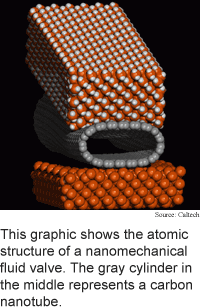
Mechanical valve design goes
nano
Building nanoscale devices is tricky because
they straddle two worlds, the molecular and the bulk material.
Designing objects on the molecular scale requires mathematical
models of the interactions of individual atoms, but even nanoscale devices
typically contain thousands of atoms, and modeling that many atoms in
detail is mathematically difficult and requires a lot of computing power.
California Institute of Technology researchers used a combination
of molecular modeling and classical engineering techniques to design a
nanomechanical fluid valve. The device could be used for drug delivery,
biological and chemical testing, and fuel delivery for microscale and
nanoscale engines.
The valve consists of a single-walled carbon nanotube connected
at one end to a fluid reservoir. A silicon cantilever is fixed to the
middle of the nanotube and the free end of the cantilever is positioned
above the free end of the tube. When the cantilever is deflected, it presses
on the nanotube, pinching it closed. A single layer of acrylic acid molecules
is affixed to the surface of the cantilever and causes the cantilever
to deflect when the pH level of the surrounding environment is high, or
basic.
The researchers used classical engineering techniques to approximate
the design, and molecular modeling to determine precise values for pinching
the nanotube. The prototype designs range from 34.5 to 70 nanometers in
length and contain about 75,000 atoms.
High-resolution inkjet printers could be design using the system
in about three years, but it is likely to be closer to 10 years before
drug delivery applications are practical, according to the researchers.
The work is scheduled to appear in the November issue of Nanotechnology.
Biochip spots single viruses
Cooler material boosts fuel cells
Pen stroke cuts PDA Web clutter
Wide laser makes simple tweezers
Briefs:
Biochip levitates droplets
Nanotubes form transparent film
Molecules positioned on silicon
Mechanical valve design goes nano
Angles increase optical storage
Crystal links ultraviolet photons

Research Watch blog
View from the High Ground Q&A
How It Works
RSS Feeds:
News
Ad links:
Buy an ad link
Ad links: Clear History
Buy an ad link
|
TRN
Newswire and Headline Feeds for Web sites
|
© Copyright Technology Research News, LLC 2000-2010. All rights reserved.